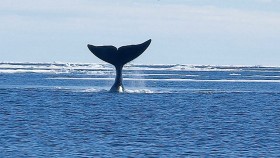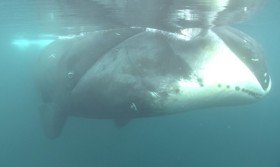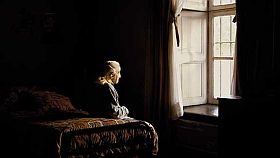Det her er billeder fra en hvals biografi. Det første viser vores hval, som dier, det andet er vores hval i parringsdans årtier senere, det tredje still er vist nok fra filmens slutning. Vores hval er nu mere end 200 år gammel. En Grønlandshval kan nemlig blive så gammel, hvis den er heldig og undgår sin værste fjende, mennesket. Det er mærkeligt. Jeg accepterer det. Jeg er mange gange i filmens forløb og i lang tid med på dens forudsætning, at jeg følger en bestemt hval, vores hval, som bliver meget gammel, den er født i 1700-tallet og den lever endnu. Til forskel fra de fleste af dens slags, som blev fanget og kogt til hvalolie under den europæiske industrialisering gennem 1800-tallet. Det er kort fortalt filmens handling.
Jeg gik skeptisk til Adam Schmedes‘ film, for jeg vidste jo, at der ville være så meget, jeg ikke kunne lide, fordi jeg forstyrres af dyr med individualitet, med navne, som tillægges personlige stedord i speaken, og jeg forstyrres af rekonstruktion og pludselige spillefilmgreb, forstyrres, ja, generes direkte af omklamring, moralisering og mangel på tvivl. Og så gik det altså alligevel sådan, at filmen voksede og voksede for mine øjne, og jeg gik imponeret fra filmen, tænkte hvilken indsats og var fyldt af sorg. Denne overmåde hensynsløshed mod dette dyr havde jeg i virkeligheden ikke kendt til. Og det var jo meningen, at jeg skulle have det at vide, forstå det og sørge. Det er Adam Schmedes hensigt med sin film. Det er også på den måde et selvfølgeligt mesterværk og derfor også netop så æstetisk provokerende, for det er et værk af en stærk og egensindig mester, som kun vil det han vil.


Adam Schmedes havde 3. januar dette på sin Facebook side: ”The Eddy dogme. These 10 rules were set up in 95 as a concept to let reality and cinematography into the wildlife filming.
1 The animal is the main character.
2. Animals are filmed at eye level.
3. Identification should be with the animal and it’s conditions.
4. The environment should be seen from the pov. of the animal and reflect a world in transition, filled with human activities.
5. No talking heads. Science and factual content should be transformed into action and emotion.
6. Naration to strengten the drama or anticipate the action, clarify or problematise the content.
7. Human only in secondary roles and short appearances.
8. The film should tend to reflect the ecological truth and avoid romanticize nature.
9. All suited dramatic tools and genres can be used to achieve this goal.
10. Pure nature is pure lie.”
Lad mig se på, hvordan hans film overholder de ti regler, denne alternative æstetik, som altså Eddy, hovedpersonen i ”Kamæleonernes strand” (2008) tror jeg nok, opstillede samme år, filmkunstens år 100, det år også von Trier, Vinterberg, Kragh-Jacobsen og Levring skrev og uddelte et andet Dogme 95. Det interessante er altså ikke om Schmedes overholder Eddys ti dogmer, det ville være uinteressant at konstatere, men hvordan han gør det afgørende, fornyer det filmkunsten:
1) Dyret er hovedperson. Filmen har ved klippet af utallige dybt forbavsende optagelser af mange, mange hvaler etableret én eneste medvirkende, som den kalder vores hval.
2) Filme i øjenhøjde: Jeg er filmen igennem som ledemotiv lige ud for et hvaløje. Fotograferne har måttet arbejde neddykket ofte og længe i det iskolde vand.
3) At identificere sig, at ”holde med”: Jeg følger angst hvalen ind under isen. Kan den finde en våge? Jeg kender ikke dens kræfter, ved ikke, at den kan sprænge sig vej op gennem isen (ja, der er optagelser af det!), og jeg sænker genert blikket ved synet af penis under parringen (ja, det er filmet!).
4) Omgivelserne ses fra dyrets niveau, fra dets point of view: Grebet er så gennemført, at jeg ikke nu bagefter kan huske enkeltoptagelser, som tydeligt demonstrerer det. Jeg husker hele filmen, to hundrede års overlevelseskamp, set som vores hval husker den og fortsat lever den.
5) Talking heads: Der er ikke ekspertinterviews og vidneudsagn inde i filmen. Der er utallige bag og omkring filmen. De er omformet til et drama, filmens fortælling og følelsesindhold. Jeg kommer ikke op af vandet, bliver under isen alle filmens 58 minutter.
6) Iscenesættelse: Dramatiseringerne forbliver ved en gennemført stilisering, såvel i computerarbejdet som med de mange ens skonnerter i det samme farvand og som i de talrige monotone gentagelser af de samme få rekonstruerede harpuneringsscener kortvarige kunstigheder som mareridt, jeg midt i drømmen ved, jeg kan vågne fra.
7) Menneskene er i biroller: Og de er grimme! Snavsede, rå og brutale hvalfangere og fjollede, fnisende og parfumerede fotomodeller. Karikaturer i karikerede optagelser. (Efter min opfattelse filmens eneste, men til gengæld store svaghed. De optagelser burde være yderligere bearbejdet, så de helt forsvandt ind i det store, smukke billeddrama.)
8) Den økologiske sandhed reflekteres: Jeg er ikke et øjeblik i tvivl, det fremgår tydeligt af alt og hele tiden og sært nok uden at blive for meget, uden at blive kvalmende frelst. Det serveres nemlig barskt!
9) Hensigten helliger midlet. Jeg må sige, at hvad jesuitterne jo ikke gjorde, det gør Adam Schmedes. Intet filmisk værktøj skyr han. Og han kommer igennem med det.
10) Den rene natur findes ikke: På en mærkelig omvendt måde er Schmedes’ natursyn i slægt med Herzogs. De er begge uden illusioner. Den ene mener, at naturen brutal, den anden mener naturen er inficeret. Mennesket er problemet, jeg kunne næsten opstille en fælles antropologi.
Danmark, 2013, 58 min.






